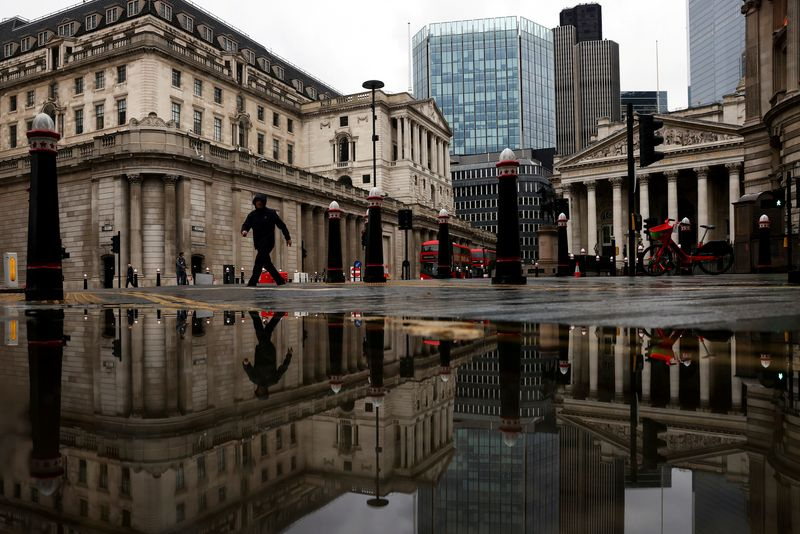Bank of England to keep recovery hopes in check despite vaccine progress By Reuters

By William Schomberg
LONDON (Reuters) – The Bank of England will probably try on Thursday to keep a lid on expectations that Britain’s economy is heading for a strong, vaccine-boosted recovery after suffering its worst crash in three centuries last year.
The central bank is not expected to change its huge, crisis-fighting stimulus programme at 1200 GMT, after its March policy meetings.
Instead, investors will be trying to gauge how confident it is that Europe’s fastest COVID-19 vaccination campaign and yet more spending and tax cuts in finance minister Rishi Sunak’s March 3 budget will trigger a bounce-back in the months ahead.
BoE Governor Andrew Bailey said on Monday he was more optimistic about the recovery. But he stressed his view came “with a large dose of caution” with Britain still in the grip of a third lockdown and facing the risk of new COVID-19 variants.
The health service warned on Wednesday of a big reduction in available vaccines from March 29.
Bailey also said a jump in interest rates in financial markets – from almost record-low levels – was consistent with the better outlook, suggesting he was not worried about investors pricing in BoE rate hikes starting next year.
On Wednesday, rate futures markets saw an 80% chance of a single increase in Bank Rate to 0.25% by September 2022 from its current all-time low of 0.1%.
Sterling has been the second-strongest performer against the U.S. dollar this year among the so-called G10 currencies.
But Deutsche Bank (DE:DBKGn) economist Sanjay Raja said speculation that the BoE might raise interest rates before the U.S. Federal Reserve looked misplaced.
“While the timing of any unwinding of policy support remains highly uncertain, the UK sits well behind the U.S. in both growth and inflation expectations,” Raja said.
At the end of 2020 Britain’s economy was 92% of its size a year earlier. The U.S. economy was 98% of its pre-pandemic size.
The Federal Reserve again pledged on Wednesday to keep rates near zero at least until 2023 even as it forecast a sharp jump in economic growth and inflation in 2021.
Another factor likely to slow any rate hike by the BoE is finance minister Sunak’s plan for tax hikes and spending curbs, after his new, short-term public spending boost and tax cuts.
Investors will be watching Thursday’s BoE statement for any signs that it is preparing to raise once again its 895 billion-pound bond-buying programme to help the economy in its recovery.
On the other hand, the BoE might signal that it will pare back the pace of the programme in order to stretch it over 2021.
That would be seen as one of the first moves by a top central bank to slow the pace of stimulus.
The debate marks a sharp turnaround from the start of 2021 when investors were betting on the possibility of the BoE resorting to negative interest rates to revive the economy.
Some members of the nine-strong Monetary Policy Committee have sounded more worried than Bailey about a weak recovery which they have said could yet justify negative rates later this year, once banks have had time to prepare.
Only BoE Chief Economist Andy Haldane has sounded the alarm about an inflation “tiger”.
The BoE will also use this week’s meetings to check its assumption that new post-Brexit trading arrangements that began on Jan. 1 would reduce GDP this quarter by 1%.
($1 = 0.7201 pounds)

